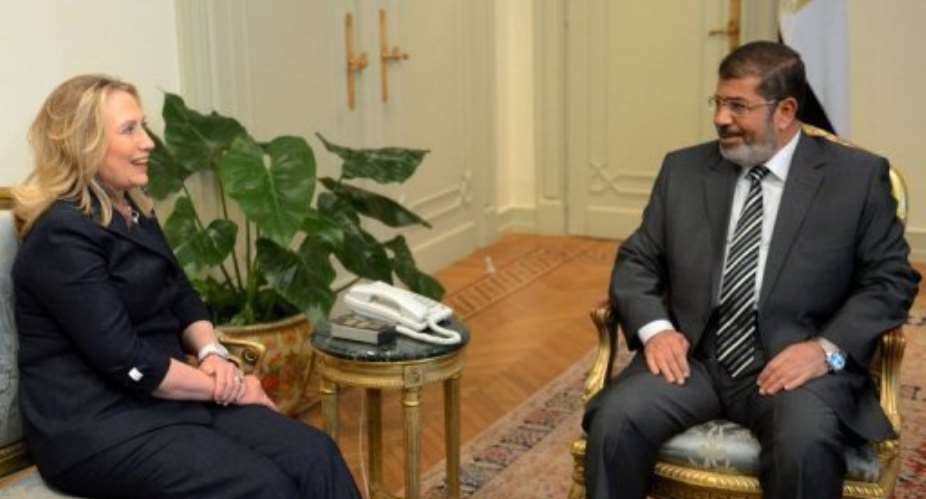CAIRO (AFP) - US Secretary of State Hillary Clinton threw Washington's weight behind Egypt's democratic transition Saturday in talks with new President Mohamed Morsi, laying out plans for economic help to the country.
"I have come to Cairo to reaffirm the strong support of the United States for the Egyptian people and their democratic transition," Clinton told a joint news conference with Foreign Minister Mohammed Amr after her meeting with Morsi.
"We want to be a good partner. We want to support the democracy that has been achieved by the courage and sacrifice of the Egyptian people, and to see a future of great potential be realised," she said.
During her two-day visit, the top US diplomat will also meet Field Marshal Hussein Tantawi -- the country's interim military ruler after Hosni Mubarak was ousted last year.
Clinton steps into the political maelstrom of a complex power struggle between the Islamist president and the Supreme Council of the Armed Forces (SCAF) that ruled Egypt after Mubarak was toppled.
Last week, Morsi ordered parliament to convene, defying a military decision to disband the house after the country's top court ruled it invalid.
"Democracy is hard," Clinton said. "It requires dialogue and compromise and real politics. We are encouraged and we want to be helpful. But we know that it is not for the United States to decide, it is for the Egyptian people to decide."
Clinton's meeting with Morsi, a longtime member of the Muslim Brotherhood, comes after Egypt's first free presidential elections following the ouster of decades-old US ally Mubarak.
"We are very, very keen to meet you and happy you are here," Morsi told Clinton as they met at the presidential palace in Cairo's upmarket Heliopolmet district.
With the economy in a shambles due to a fall in tourism and a lack of growth, Clinton outlined economic support "to help Egypt stabilize its economy and to use debt relief to foster innovation, growth and job creation."
She unveiled plans for $250 million in loan guarantees to Egyptian small and medium-sized businesss, as well as setting up a US-Egypt enterprise fund with some $60 million in capital.
It was her first meeting with Morsi since he took the oath of office.
Morsi's decree was applauded by supporters who believed the court's decision to disband parliament was political, but it set off a firestorm of criticism from opponents who accused him of overstepping his authority.
His decision was seen as an opening shot in a power struggle between Egypt's first civilian leader and the Mubarak-appointed generals who wanted to retain broad powers even after they transferred control on June 30.
But on Wednesday, the president said he would respect a court ruling overturning his decree, in an apparent bid to mollify an infuriated judiciary and the military.
Clinton said the United States supported the full transition to civilian rule, but added she wanted to commend the military council, or SCAF, "for representing the Egyptian people in the revolution."
"As compared to what we are seeing in Syria which is the military murdering their own people, the SCAF here protected the Egyptian nation," and had overseen free elections, Clinton said.
Several hundred protesters meanwhile gathered outside the US embassy and later Clinton's hotel to denounce what they said was "US interference in domestic affairs," the official MENA news agency reported.
Clinton will also focus on the protection of religious minorities and of women, and was due to travel Tuesday to the port city of Alexandria to visit women activists and Coptic leaders.
The post-revolution rise of the Islamists has raised fears among women and among the country's 10-million-strong Christian community that their rights could be rolled back.
Morsi has repeatedly pledged to be a president for "all Egyptians" and said he would appoint a woman and a Christian as his deputies.
During the visit, Clinton will also seek assurances that the key US Middle East ally will continue to uphold a peace treaty with Israel signed in 1979.
The treaty had "allowed a generation to grow up without knowing war and on this foundation, we will work together to build a just comprehensive regional peace in the Middle East," Clinton said.





 Adu Boahen’s murder: Police arrest house help who was in possession of deceased’...
Adu Boahen’s murder: Police arrest house help who was in possession of deceased’...
 Akufo-Addo nominates Felicia Attipoe as Tema West MCE
Akufo-Addo nominates Felicia Attipoe as Tema West MCE
 Election 2024: I can't have someone I defeated twice as my successor – Akufo-Add...
Election 2024: I can't have someone I defeated twice as my successor – Akufo-Add...
 We’ll protect state wealth from opaque deals – Prof Jane Naana
We’ll protect state wealth from opaque deals – Prof Jane Naana
 Mauritania president says running for second term in June polls
Mauritania president says running for second term in June polls
 I won't ever say I was a mere driver’s mate' — Prof. Opoku-Agyemang
I won't ever say I was a mere driver’s mate' — Prof. Opoku-Agyemang
 2024 polls: 'EC struggling to defend credibility'— Prof. Opoku-Agyemang
2024 polls: 'EC struggling to defend credibility'— Prof. Opoku-Agyemang
 NPP will remain in gov’t till Jesus comes — Diana Asamoah
NPP will remain in gov’t till Jesus comes — Diana Asamoah
 Sunyani Technical University demands apology from former SRC president over sex-...
Sunyani Technical University demands apology from former SRC president over sex-...
 'Dumsor' was resolved by Mahama but ‘incompetent' Akufo-Addo has destroyed the g...
'Dumsor' was resolved by Mahama but ‘incompetent' Akufo-Addo has destroyed the g...
